Bleepmasters |
|
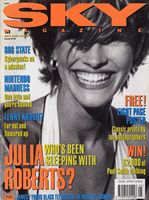 |
Sky |
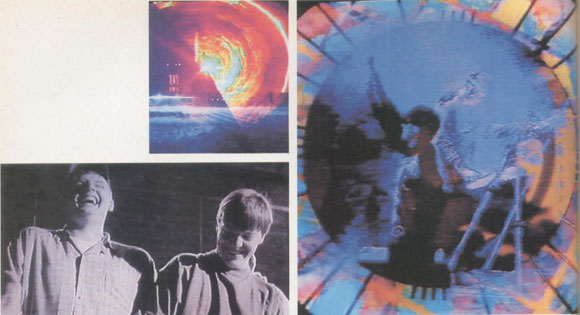 808 STATE 1991: Manchester's 808 State are busy building the kind of northern techno empire that could cause Sony a few problems before the end of the century. Currently controlling a thriving record shop business, a syndicated radio station and a virtual monopoly on the local T-shirt industry, they still find time to make futuristic, in yer face, Atari-crazed house music. Paul Lester talks to the baggy-jeaned Gordon Gekkos. STATE DATA 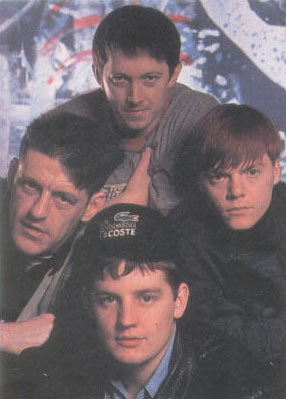 Clockwise from left: MARTIN PRICE (36) - keyboards. Owner of
Manchester's Eastern Bloc record shop. STATE PRECEDENTS ART OF NOISE 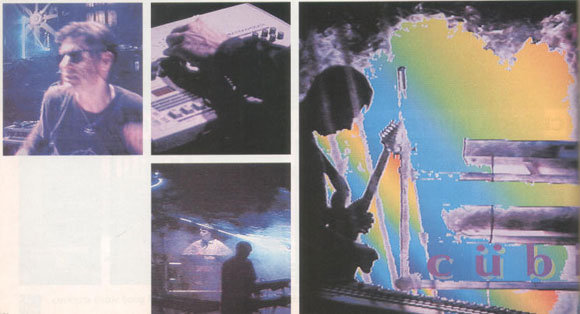 Who are 808 State? They have had more hits than any other Manchester band in existence, and yet you wouldn't know them if they came and thumped you in the face. Graham Massey, 808's resident technical expert and melodic ideas man, proves this with his story about the fax machine sales representative. Apparently Graham, Martin, Andrew and Darren were quietly decorating their equipment warehouse on the outskirts of the city centre - just after their Top 10 success with In Yer Face - when the aforementioned rep wandered in to see if he could tout any trade. "It was a classic," remembers Graham, perched, as are the rest of the group, on rickety chairs or silver flight cases in the very same warehouse. "'What's goin' on 'ere?' he goes, and we go, 'Dunno mate, we're painters and decorators'. And he was dead interested and wanted to know who the place belonged to. So we go, 'Er, 808 summat', and he goes, 'Oh, 808, right - I know them, they used to be up at Mount Street, yeah, Darren and Graham'. And he's stood staring at us, saying all this to our faces, asking, 'Have you got a contact number for Graham, I really need to speak to him?"' The lads found the incident extremely amusing ("I was laughing me bollocks off", says Darren), but if did highlight the interesting notion that, even with half-a-dozen hit records to their credit, 808 State are no more instantly recognisable now than they were in the pre-808 days when Martin Price ran the respected, obscure indie/import 12-inch Eastern Bloc record shop full-time, Graham was experimenting with radical funk outfit Biting Tongues, and Andrew Barker and Darren Partington worked as DJs on the youth club circuit. 808's down-to-earth, no-nonsense attitude couldn't be more at odds with their out-of-this-world, futuristic bleepscapes. They almost seem to revel in their ordinariness. When they worked on their current album, Ex. El, for example, they made friends, not with the studio managers and high-flyers, but with the hired help. "We get on with the shit-shovellers, not the owners," says the irrepressible Partington. "We don't shake hands with the top brass, we get to know the tape-op or the cleaner." "We're not arse-lickers. We've got more in common with the brew-boy," says the equally quotable Price, who knows that 808's success means they don't have to bow down to any top-ranking music business official. "We've had more hits than most people. We don't have to explain to no bastard what we do." The rise of 808 State is symptomatic of two connected trends in contemporary pop - the unparalleled hegemony of dance music, and the decline of the pin-up/star. Nowadays, the charts are filled with dance acts featuring guest artists no one's ever heard of (C&C Music Factory, Nomad, Source), most of whom will disappear as quickly as they came, all of them having reached the Top 40 via the clubs, and none of them having any discernible personality whatsoever. 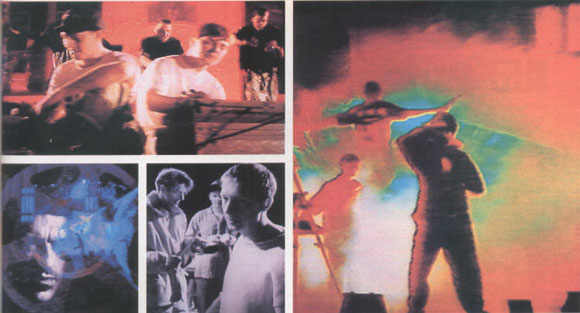 Because consumers are buying plastic, not people, there is a dearth of colourful, larger than-life characters at the moment. People are having hits based on tunes, not cheekbones. Ergo, KLF, N-Joi and...808 State. "Stars?" says Graham, wondering why your regular clubber might need to know the birthsign/favourite food/politics of the artist in question before he or she can shake a leg to their music. "They're the last thing you want when you're in a club, aren't they?" Martin: "We don't wanna talk superficial shit. Dance music is about the records, not about the people who make them." "That's a self-centred load of bullshit," says Darren. The faces that do fill up posters today seem to belong to the sort of geezers normally found down the Shed or the Kop on Saturday afternoons - Happy Mondays, The Farm, The La's... "Yeah, but look at those bands, and people from Manchester like Northside, the Inspirals, us and a couple of others," Martin says. "I bet you there's more kids who've met them, got into them and actually realised who they are, than any other acts from any other time." Still, it remains true that people are fascinated by those one-off trailblazers who beam down from distant planets and live the lives of superhumans. Last year's infatuation with Jimi Hendrix, and this season's Jim Morrison obsession, seems to bear out the theory that audiences crave the kind of unique individuals who will indulge in vicarious thrills and death-defying adventures on their behalf. Martin finds this distasteful to say the least. "That's the biggest lie ever, that 'hope I die before I get old' thing," he says. "You spend your life surviving - no one wants to go out in a fuckin' bog with a syringe in their arm! I don't want anybody saying that about me when I die, 'I wonder if it was the CIA who did it?' I hate this industry invented around a dead person. It doesn't make tuppence worth of difference - you're gone and that's it! I mean, I used to admire Morrison, but the more I've read about him, and this film, the more I think he was a complete dickhead." "I thought he was a dickhead right off," chips in Graham. "Flakes don't make it these days. You couldn't take the classic flake like Jim Morrison and put him into today's music scene - nobody would pick him up" How about Shaun Ryder, whose exploits in Penthouse and recent sojourn in a drug rehabilitation clinic perhaps expose him as a latterday flake? "No. A flake is someone who's bad at handling life, and immerses themselves in drugs and alcohol and stuff. Shaun's the prime example of a survivor." In the 60s pop was more of a community and people got together to celebrate the same guru types at the same time, a situation that was helped by the fact that these were iconic figureheads - The Beatles, The Stones, The Doors, Bob Dylan - who had political clout as well as pout appeal. 808 State, like their knob-twiddling peers (The Orb, The Grid, Neutron 9000), hardly have their fingers on the political pulse. Music is just another consumer durable these days. 808 partly agree, while also telling me how Pacific State, their first hit, was a beat-box favourite in East/West Berlin when the Wall came down. Graham also informs me that not only has 808's music done its bit for world peace, it was essential listening in the war-torn Middle East. "We got this letter off a tank crew in the Gulf, saying The North At Its Heights was their number-one tape on the ghetto blaster in their tank!" he says, as Darren decides 808 offer as perfect a soundtrack for foxhole listening as did Hendrix to the Vietnam vets 20 years ago. "You could go into battle with Cubik, easily - imagine that on yer headset, man!" 808 State may just be four local boys made good whose escapist musical fantasies fail to address the issues of the day, but they aren't total strangers to some of the excesses of pop stardom. On a recent mini-tour of Japan, they found themselves the victims of an unexpected degree of pandemonium and hero worship. "We were a bit like The Osmonds after one gig," Graham recalls. "It was great - we were like proper pop stars! We had to sneak out the venue through the basement, back to the hotel. The best bit was when all these Japanese kids held up their own 303 drum machines, like we use, down at the front of the gig. They were trying to be like us." "And they had their own Eastern Bloc bags!" Martin says. "People knew us walking round Tokyo. Girls kept coming up to us non-stop for autographs. Within three days, our hotel was teeming with them. It's because we're British and from Manchester." Darren: "Manchester's massive over there." Graham: "They know how to dance like Bez and stuff." Martin: "If we'd had the right gear in our suitcases - some bootflares and paisley shirts and stuff - we could have gone there, changed into Manchester folk, and gone down even better!" Unfortunately 808 didn't have the "right gear". Similarly, today they are slopping around in well-worn trousers and sweatshirts with the same sort of dishevelled lack of concern for the finer points of fashion that they usually bring to bear on their live performances. One week after this interview 808 were due to play to a crowd of 10,000 at Manchester's enormous G-Mex centre. Were they going to wrap themselves in ready-made designer haute-couture for the occasion? "No, we'll goon dead scruffy as usual,' says Martin, with an air of determination. 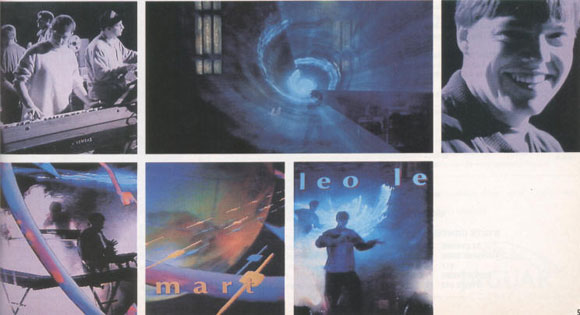 "With us, it's got to be baggy, comfortable and lightweight," Darren says. "It can't be too tight with all the running about we do on stage." Martin: "As soon as fashion starts getting more fitted, that's us out the window. I look like a stick with a bump on it in tight clothes." Graham: "Yeah -the 808 designer belly!" 808 State are not dictated to by fashion trends any more than they are pressurised to take the easy musical route to mega-popularity. The sales figures for Ex. El - possibly the least obviously accessible collection of metallic dance beats and Euro-influenced arabesques to ever hit the charts - indicate that, as with Twin Peaks, innovation and even downright weirdness don't necessarily preclude huge public acclaim. 808 never underestimate their audience. Their choice of collaborators for three of the album tracks emphasise this point. Not for 808 your traditional Kim Mazelle-type big-voiced house belter. For Spanish Heart, an Italian disco cut, they chose Bernard Sumner, singer with fellow sonic explorers, New Order and Electronic; and for Qmart, and the current 808 single, Ooops!, Bjork - from Iceland's The Sugarcubes -was drafted in. In fact it was Bjork who first approached 808 State, the latter being her favourite group, along with NWA and Public Enemy. "I've been listening to their music for years," says the tiny Sugarcube, a girl who speaks in squeaks and hiccups, on the phone from Reykjavik. "It's very exciting to be a part of something like that. They're very NOW, very exciting. They really get me going!" How did the collaboration come about? "I decided to be brave and ring them up. I just introduced myself as an Icelandic girl who wanted to sing on their records. So I went to Manchester and did two tracks:' Ooops! is like a cross between old Associates and new Pet Shop Boys, featuring Bjork's extraordinary octave-leaping voice. It would be interesting to see her singing it with 808 on Top Of The Pops. "Ooooh-ooooh!" yells Bjork, with the kind of excitable gasps normally heard from children tobogganing down ski slopes. "Will it be a hit? That'd be a joke" The State boys were more than slightly in awe of Bjork. "She just walked in the fuckin' place and it was like, 'Wooooh!"' says Darren, his eyes widening with the memory. "Bjork looks like you wanna rub noses with her straight away, know what I mean?" Martin says. "She's dead good-looking and cute. But she's a formidable woman, a huge character. We were like three shy little lads with her." Bjork felt her fair share of shyness as well. "I was like a schoolkid," she says, in between cooking beef in orange sauce ("I'm a total addict to good food"). Was it good fun working with 808? "Yeah. But the hardest part was their accent - they had to say everything five times. I think it's time they started learning Icelandic." Working with Bernard Sumner was an easy-going affair, as Darren relates. "When there's mutual respect, the barriers break down." Bernard testifies to the good feelings on both sides when he tells me, "I really admire 808, they're the only new Manchester group I like." "Both parties expected a bit of a pop star thing, but it just wasn't there," Martin says. And Darren adds, "It was like, 'Yeah, Bernard, you're just the same as us - only you've got more money'." "We'd never just shove one of yer typical wailing slags out front to sing on our records. That's why the public are puzzled by us, because we change our minds at the last minute and do things they're not expecting. We've got this dead awkward streak. D'you know," Martin says, changing tack. "There's sixth-formers out there who actually fancy some of this band, and I haven't the slightest fuckin' clue why. But I know that if we played the game and groomed ourselves a bit we could be a lot bigger than we are." Do 808 attract obsessive types who follow them round? "How can you be obsessed with us? Look at the fuckin' state of us! Anyone who stands around for six hours waiting in the freezing cold for one of us has got to be inadequate!" It's that ordinary factor again. Not that 808's normality will prove to be their undoing. Far from it - it's exactly why they're going to be around for ages. "You're never gonna get rid of us," Martin threatens, good-naturedly. "It's as simple as that. We're gonna stay here and annoy the fuck out of people for years!" 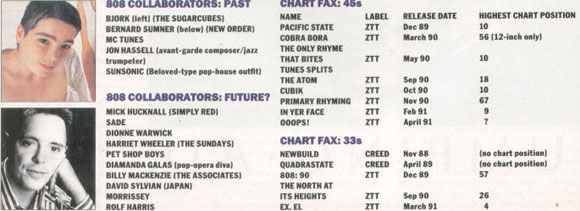 |
|